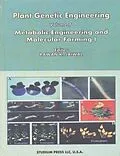Plants are the most abundant and cost effective renewable resource uniquely adapted for synthesis of several thousands of metabolites that are used as food, feed, fuel, medicines and raw materials for the various industries. Unfortunately, our food crops do not contain these metabolites in sufficient amount to meet out the nutritional and therapeutic needs to maintain optimal human health. The improvements in nutritional and therapeutic qualities of plants have inadequately been achieved previously by the traditional methods of plant breeding. Recent advances in gene technologies have made it possible to modify the existing or to introduce a new metabolic pathway in plants. The book highlights the current understanding of applications of molecular/genetic techniques in controlling biosynthetic pathways, new technologies to manipulate the content and composition of starch, fructants, proteins, amino acids, fatty acids, vitamins (A, C, 0 and E), antioxidants, minerals, sterols, pigments, isoflavonoids, terpenoids, lignins, alkaloids and other secondary metabolites, recombinant proteins (vaccines, antibodies, pharmaceutical proteins), industrial enzymes, elimination of the production of toxic substances and decrease in allergenicity of food in crop plants to meet the human needs in a sustainable way. The risk assessment and regulation of genetically modified (GM) foods have also been described. Such GM plants with clear and direct health benefits for the consumers should lead to greater acceptance of crop genetic engineering. The leading world's experts in their respective areas have prepared the chapters of this monograph. The book is valuable for researchers, graduate students, scientists, planners, technocrats and industrialists working in the area of biotechnology, molecular biology, biochemistry, plant biology, plant physiology, genetics, agronomy, horticulture, agriculture, food and pharmaceutical sciences.
Autorentext
Pawan K. Jaiwal is a senior Reader in the Department of Biosciences, M. D. University, Rohtak, India. He is teaching Molecular Biology, rDNA technology and Plant Biotechnology courses to graduate and postgraduate students since 1986. He has throughout first division academic career with Ph. D. in Botany (Plant Physiology) from Kurukshetra University, Kurukshetra, India. He has more than 70 research publications including original research papers, reviews and book chapters in reputed International research journals and books. He has edited thirteen books published by International publishers. Dr. Jaiwal has been awarded DST Young Scientist Project, INSA Visiting Fellowship, New Delhi and DBT Overseas Associate ship (Long Term) for advance research at laboratory of Prof Ingo Potrykus, ETH, Switzerland. Dr. Jaiwal is a member of several academic bodies and on the Editorial Board of four International research journals. He has guided many students for Ph. D., M. Phil, and M. Sc. Degrees. He has completed many research projects on Biotechnology for improvement of important grain legumes. His group has developed gene transfer protocols in Vigna radiata and K mungo for the first time. His current research interests are metabolic engineering for resistance to a biotic and biotic stresses, improvement of nutrient use efficiency and nutritional quality of grain legumes and oil crops.
